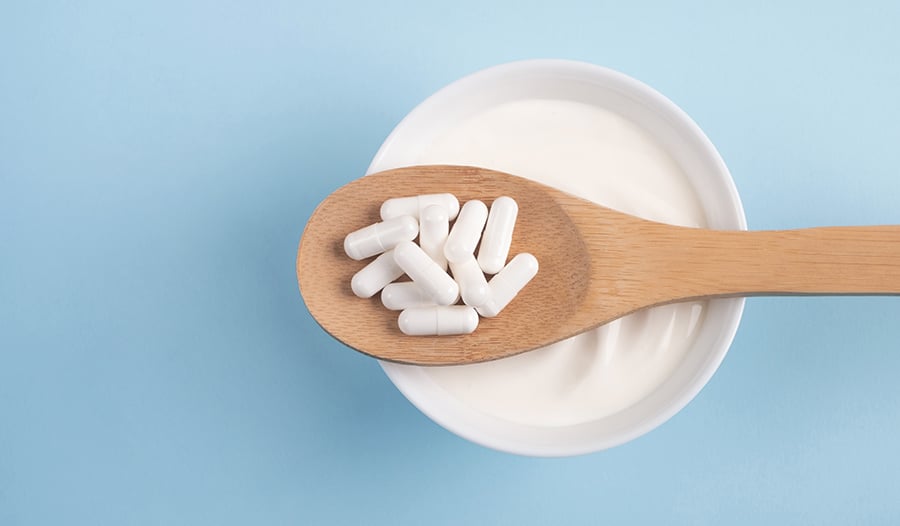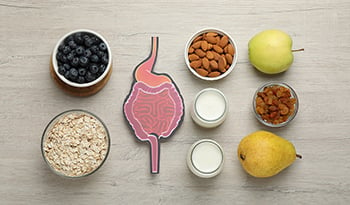Akkermansia Muciniphila: The Microbiome Superstar You Need to Know
DISCLAIMER:This blog does not intend to provide diagnosis...
- In this article:
- What Makes Akkermansia muciniphila Important?
- A. muciniphila and Diabetes
- What Does the Research Say About A. muciniphila?
- Enhancing the Growth of A. muciniphila in Your Intestinal Microbiome
- What Is a FODMAP Diet?
- Flavonoids Promote the Growth of A. muciniphila
- Fish Oils Increase the Growth of A. muciniphila
- Berberine Increases the Growth of A. muciniphila
- Final Comments

Research on the intestinal microbiome is uncovering potential new probiotic species that could revolutionize medicine. The gut microbiome is a complex and diverse system composed of genetic material from trillions of microorganisms (microbiota). Without question, the microbiome is a huge contributor to our health and wellness.
Research shows that the microbiome profoundly impacts various systems and plays crucial roles in digestive, immune, and mental health. An imbalance in the intestinal microbiome may lead to a wide range of issues, ranging from occasional symptoms of digestive distress like gas and bloating to broader systemic challenges such as obesity, diabetes, Alzheimer's disease, inflammation, etc.
The bacteria Akkermansia muciniphila is particularly exciting as it plays a key role in the health of the gut lining as well as promote improved insulin action to help fight obesity and blood sugar control. The effects are not limited to its live probiotic effects but rather to some of the compounds that the bacteria itself manufactures.
As a result, A. muciniphila has been shown to be more effective when it is dead vs. live. It is not alone in this effect; several lactic acid-producing probiotic organisms, such as Lactobacillus and Bifidobacter species, have also been effective when heat-killed. The effectiveness of these "zombie" or dead microbes is challenging the commercial dogma that the only effective probiotic bacteria live as expressed in colony-forming units (CFUs). That is not the case for A. muciniphila.
What Makes Akkermansia muciniphila Important?
Akkermansia muciniphila plays a critical role in the mucin layer's health, protecting the cells that line the intestinal tract. That is why it is given its strain name muciniphila – the Latin suffix phila means love. So, muciniphila translates as "love of mucin."
A. muciniphila works with the epithelial cells that line the intestines to produce mucin. And that goes a long way in protecting the gut lining from damage. Not surprisingly, higher levels of A. muciniphila are associated with improved intestinal barrier function, reduced intestinal permeability (leaky gut), and improved overall digestive and absorptive function. Without sufficient A. muciniphila, the gut barrier is compromised, leading to the absorption of gut-derived toxins that overstimulate the immune system and produce a lot of inflammation. These gut-derived toxins can also lead to a condition known as non-alcoholic fatty liver disease and produce systemic inflammatory effects that can lead to arthritis, skin disorders, cardiovascular disease, and brain disorders.1-6
A. muciniphila and Diabetes
All the effects on the mucin layer by Akkermansia muciniphila are exciting, but what makes researchers excited are its effects on diabetes and obesity.
As the levels of A. muciniphila go down in the human microbiome, obesity, diabetes, inflammation, and metabolic disorders increase. And as the levels of A. muciniphila go up in the human microbiome, the rates of obesity, diabetes, inflammation, and metabolic disorders decrease. The assumption is that these disorders are associated with altered gut barrier function due to reduced mucin protection, which leads to the absorption of many gut-derived toxins that trigger a cascade of different systems that promote chronic inflammation and insulin resistance.1-7
What Does the Research Say About A. muciniphila?
The first human clinical trial with Akkermansia muciniphila was published in the online edition of Nature Medicine on July 1, 2019. Thirty-two subjects with pre-diabetes and evidence of metabolic syndrome (abdominal obesity, elevated blood lipids, high blood pressure, etc.) were randomized to get either a placebo or live or heat-killed (pasteurized) A. muciniphila. The active treatment groups taking A. muciniphila took around 10 billion bacteria (either dead or alive) daily for three months.
The primary purpose of the study was to evaluate safety. A muciniphila passed that test with flying colors. It also displayed effects noted on multiple markers of metabolism and overall health. Compared with placebo, insulin sensitivity increased while total cholesterol and some markers of inflammation and liver function improved. There was also a significant decrease in the white blood cell (WBC) count in those who got the bacteria. The thought is that strengthening the gut barrier led to a reduced absorption of gut-derived toxins that trigger an increase in white blood cell levels. Absorption of gut-derived toxins is also a huge factor in causing impaired liver function.
Here is the exciting part of the study, the dead bacteria outperformed the live bacteria. I have been stressing this effect for certain probiotics for years, but mainly to deaf ears. The marketplace is focused on colony-forming units over clinical data. That is a mistake. The focus should be on clinically tested forms and dosages.
There is a growing body of research on dead, non-viable probiotics, including their effectiveness in diarrhea and gastrointestinal infections, immune system enhancement and regulation, modulation of gut microbiota, and recovery from intestinal injury.
These bacterial preparations are known as "ghost probiotics," "postbiotics," "inactivated probiotics," and now "para probiotics." The benefits of some products have nothing to do with the organism being alive but instead are due to unique cellular components of the bacteria that are there, whether the bacteria is alive or dead.8 That is the case with A. muciniphila.
One of the critical features of A. muciniphila is that it is very "slimy" because it is covered in molecules known as exopolysaccharides. These slimy compounds prevent white blood cells from breaking down a beneficial protein known as Amuc_1100, found in the cell membrane surrounding A. muciniphila. It turns out that this protein is the secret to the bacteria's beneficial effects.
When purified Amuc_1100 is given to mice it exerts the same effects as the live or heat-killed bacteria. The heat-killed bacteria produce better effects than the live form of A. muciniphila because it removes the exopolysaccharides coating but leaves the Amuc_1100 intact. Amuc_1100 then acts on cells that line the intestines to tighten up the space between the cells, reduce inflammation, and prevent the absorption of gut-derived toxins that lead to insulin resistance, non-alcoholic fatty liver disease, obesity, and type 2 diabetes.1-6
A. muciniphila and Blood Sugar Control
As a probiotic, live Akkermansia muciniphila may help improve the level of the bacteria in the gut microbiome. And this increase could result in clinical benefits. Another double-blind study in 76 subjects with type 2 diabetes featured a probiotic formula that contained live A. muciniphila with four other bacteria: Clostridium beijerinckii, Clostridium butyricum, Bifidobacterium infantis, and Anaerobutyricum hallii.9 Subjects in the probiotic group who were also taking the drug metformin this probiotic at a dosage of 3 capsules twice daily for 12 weeks experienced improvement in blood sugar control compared to the placebo group.
Specifically, after 12 weeks of supplementation compared to baseline measurement, modest improvements were noted in blood sugar measurements in a standard 3-hour meal-tolerance test and A1C levels. A1C is a measurement of 3-month blood sugar control. After 12 weeks of probiotic supplementation, the A1C measurement dropped by 0.6%. It needs to be discovered how much A. muciniphila contributed to the improvement as the other bacteria have some actions in supporting blood sugar control as well.
Enhancing the Growth of A. muciniphila in Your Intestinal Microbiome
Though Akkermansia muciniphila is now available as a probiotic, it is also essential to take advantage of dietary factors that support the growth of this bacteria. The suitable organisms in our microbiome are often already there; they need nourishment like a lawn needs the suitable soil and fertilizer.
Focusing on creating suitable "soil" and "fertilizers" to grow A. muciniphila and other beneficial probiotics is important in establishing the optimum microbiome. A few things have been shown to be effective in promoting the growth of A. muciniphila, most notably a FODMAP diet, flavonoids, fish oils, and berberine.
What Is a FODMAP Diet?
FODMAP is an acronym for:
- Fermentable – foods that are quicken broken down (fermented) by bacteria in the large intestine
- Oligosaccharides – "oligo" means "few," and "saccharide" means sugar. These molecules are made up of individual sugars joined together in a chain. Beans are a common source of oligosaccharides.
- Disaccharides – "di" means two sugar, so a disaccharide comprises two sugar molecules bonded together. Sucrose is a disaccharide.
- Monosaccharides – "mono" means single, so a monosaccharide is a single sugar molecule. Fructose is a monosaccharide.
- And
- Polyols – these are sugar alcohols often used as sweeteners. Some examples are xylitol, maltitol, and erythritol.
Not all FODMAPs are health-promoting. Here is a list of some common foods and ingredients that are high in health-promoting FODMAPs that can promote the growth of A. muciniphila:10
- Vegetables: Artichokes, asparagus, broccoli, beetroot, Brussels sprouts, cabbage, cauliflower, garlic, fennel, leaks, mushrooms, okra, onions, peas, and shallots.
- Fruit: Apples, apricots, blackberries, boysenberries, cherries, dates, figs, pears, peaches, watermelon.
- Legumes: Beans, chickpeas, lentils, red kidney beans, baked beans, soybeans.
- Non-gluten grains: oats, amaranth, buckwheat, rice (brown, white, wild), millet, quinoa, and sorghum
Flavonoids Promote the Growth of A. muciniphila
Flavonoids are plant pigments and health-promoting compounds found in berries, many other fruit, green tea, dark chocolate, green leafy vegetables, and legumes. They are critical to the health of the microbiome. Flavonoids have been shown to dramatically increase the growth of the A. muciniphila.10,11 Dietary sources of flavonoids also provide other components (e.g., prebiotic fibers) that promote a healthy microbiome. The flavonoid quercetin is a good choice for those looking for additional support, as are extracts of pomegranate, grapeseed, pine bark, green tea, or blueberry.
Fish Oils Increase the Growth of A. muciniphila
The omega-3 fatty acids in fish oils, primarily eicosapentaenoic acid (EPA) and docosahexaenoic acid (DHA), exert profound effects on the microbiome, including an ability to support increased levels of A. muciniphila.13
Berberine Increases the Growth of A. muciniphila
Berberine is an alkaloid found in many plants, notably in goldenseal (Hydrastis canadensis) and barberry (Berberis vulgaris). Berberine exerts significant beneficial effects on digestive health and the microbiome, including increasing the levels of A. muciniphila. This effect partially explains its positive results seen in berberine supplementation in clinical trials in improving blood sugar, promoting weight management, supporting normal blood lipid levels, and improving liver function.14
Final Comments
One of the beneficial features of most healthy diets, like the Mediterranean diet, is that they are a rich source of compounds that promote the growth of A. muciniphila.
Popular diets like the ketogenic and paleo diets are often deficient in foods promoting this vital organism. It may be necessary for these individuals to supplement their diet with prebiotics, flavonoid-rich extracts, fish oils, and concentrated forms of plant foods like spirulina, barley grass juice, and other green products.
References:
- Pellegrino A, Coppola G, Santopaolo F, et al. Role of Akkermansia in Human Diseases: From Causation to Therapeutic Properties. Nutrients. 2023 Apr 8;15(8):1815.
- Jian H, Liu Y, Wang X, et al. Akkermansia muciniphila as a Next-Generation Probiotic in Modulating Human Metabolic Homeostasis and Disease Progression: A Role Mediated by Gut-Liver-Brain Axes? Int J Mol Sci. 2023 Feb 15;24(4):3900.
- Cani PD, Depommier C, Derrien M, et al. Akkermansia muciniphila: a paradigm for next-generation beneficial microorganisms. Nat Rev Gastroenterol Hepatol. 2022 Oct;19(10):625-637. doi: 10.1038/s41575-022-00631-9. Epub 2022 May 31. Erratum in: Nat Rev Gastroenterol Hepatol. 2022 Jun 23;: PMID: 35641786.
- Zhang T, Li Q, Cheng L, Buch H, Zhang F. Akkermansia muciniphila is a promising probiotic. Microb Biotechnol. 2019 Nov;12(6):1109-1125.
- Rodrigues VF, Elias-Oliveira J, Pereira ÍS, et al. Akkermansia muciniphila and Gut Immune System: A Good Friendship That Attenuates Inflammatory Bowel Disease, Obesity, and Diabetes. Front Immunol. 2022 Jul 7;13:934695.
- Sanjiwani MID, Aryadi IPH, Semadi IMS. Review of Literature on Akkermansia muciniphila and its Possible Role in the Etiopathogenesis and Therapy of Type 2 Diabetes Mellitus. J ASEAN Fed Endocr Soc. 2022;37(1):69-74.
- Depommier C, Everard A, Druart C, et al. Supplementation with Akkermansia muciniphila in overweight and obese human volunteers: a proof-of-concept exploratory study. Nat Med. 2019 Jul;25(7):1096-1103.
- Monteiro SS, Schnorr CE, Pasquali MAB. Paraprobiotics and Postbiotics-Current State of Scientific Research and Future Trends toward the Development of Functional Foods. Foods. 2023 Jun 16;12(12):2394.
- Perraudeau F, McMurdie P, Bullard J, et al. Improvements to postprandial glucose control in subjects with type 2 diabetes: a multicenter, double-blind, randomized placebo-controlled trial of a novel probiotic formulation. BMJ Open Diabetes Res Care. 2020 Jul;8(1):e001319.
- Chu N, Chan JC, Chow E. Is a diet high in FODMAPs as a novel dietary strategy in diabetes? Clin Nutr. 2022 Oct;41(10):2103-2112.
- Xu B, Qin W, Xu Y, et al. Dietary Quercetin Supplementation Attenuates Diarrhea and Intestinal Damage by Regulating Gut Microbiota in Weanling Piglets. Oxid Med Cell Longev. 2021 Dec 13;2021:6221012. doi: 10.1155/2021/6221012. PMID: 34950418; PMCID: PMC8689231.
- Rodríguez-Daza MC, de Vos WM. Polyphenols as Drivers of a Homeostatic Gut Microecology and Immuno-Metabolic Traits of Akkermansia muciniphila: From Mouse to Man. Int J Mol Sci. 2022 Dec 20;24(1):45.
- Roussel C, Anunciação Braga Guebara S, et al. Short-term supplementation with ω-3 polyunsaturated fatty acids modulates primarily mucolytic species from the gut luminal mucin niche in a human fermentation system. Gut Microbes. 2022 Jan-Dec;14(1):2120344.
- Dong C, Yu J, Yang Y, Zhang F, Su W, Fan Q, Wu C, Wu S. Berberine, a potential prebiotic to indirectly promote Akkermansia growth through stimulating gut mucin secretion. Biomed Pharmacother. 2021 Jul;139:111595.

 By Dr. Michael Murray, N.D.
By Dr. Michael Murray, N.D. 


